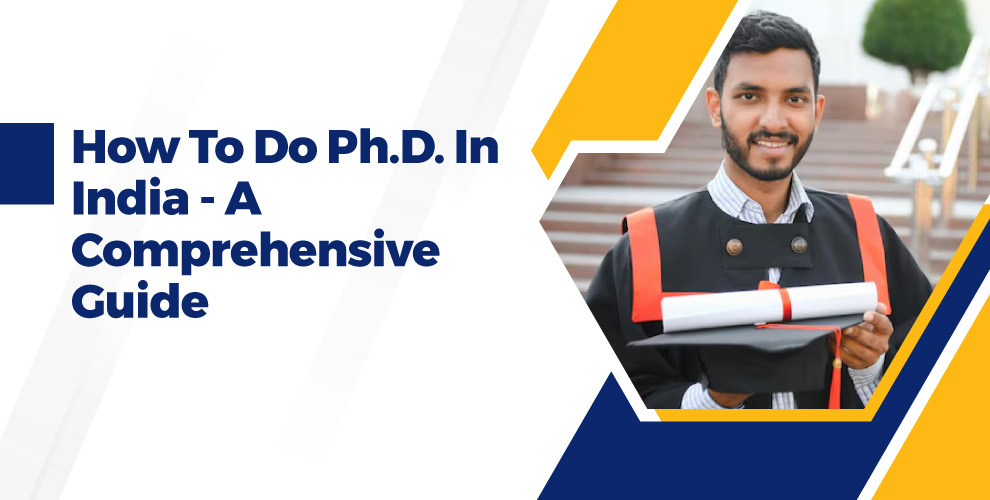Introduction
Are you a passionate scholar and want to do a Ph.D. in India? But not sure where to start. This following guide will help you get through the process. That’s a great decision. A Ph.D. is a highly rewarding journey for those passionate about core learning and research. This blog will explain the basics and provide you with a roadmap to help you understand how to do a Ph.D. in India effectively.
What is a Ph.D.? Why Should Someone Consider Pursuing One?
A Doctor of Philosophy (Ph.D.) is a prestigious degree awarded by universities. It needs deep research, spacing new knowledge to a particular field. The process includes coursework, research, and defending your findings before a panel. It is tough but intellectually stimulating. There are many reasons. Some do it to advance in academia, becoming professors or researchers. Others do it for career advancement in specialized fields or to fulfill personal intellectual curiosity.
A Ph.D. makes you well versed in critical thinking, problem-solving, and research skills highly valued across industries.
Different Types of PhD Courses in India
You might have several questions. How to get a Ph.D. and its types. There are 5 different types of Ph.D. programs. Broadly, these include:
- Full-Time Ph.D.: This requires a full-time commitment and is ideal for those focused solely on research.
- Part-Time Ph.D.: Suitable for working professionals.
- Integrated Ph.D.: Combines a master’s and doctoral degree, which is common in science and technology fields.
- Online/Distance Ph.D.: Limited but emerging, catering to those who can’t attend physically.
- Sponsored Ph.D.: For professionals sponsored by their employers for advanced research.
Eligibility Criteria for Ph.D. in India
The basic eligibility for Ph.D. programs includes:
- A master’s degree in a similar field with a minimum of 55%.
- Some universities require qualifying national-level exams like UGC-NET, CSIR-NET, or GATE.
- A decent research proposal.
There are few exceptions. Candidates with exceptional academic records or publications may receive relaxation in requirements. Some universities even allow direct entry into Ph.D. programs after a bachelor’s degree through integrated courses.
How to do a PhD in India?
Great decision to pursue a PhD! First, choose your research area. Ensure you meet the eligibility criteria, usually a master’s degree with 55% marks. Then, prepare for entrance exams like UGC-NET / GATE.
Research universities offering strong programs in your field, apply, and prepare for interviews. Don’t forget to explore scholarships like JRF or institutional funding. Stay committed and passionate—it is a journey of persistence and discovery!
Ph.D. Entrance Exams in India
To get a Ph.D., you need to clear entrance exams conducted at the national, state, or university levels. Key exams include:
- UGC-NET: For eligibility in teaching and research.
- CSIR-NET: focuses on science and technology disciplines.
- GATE: Common for engineering and technology fields.
- ICAR-NET: For agricultural sciences.
- University-specific exams like JNU-ET, BHU-RET, etc.
Some institutions, like IITs, accept GATE, while universities like DU require UGC-NET.
Best Universities for Ph.D. in India:
Which universities are considered the best for Ph.D. programs in India? India has many reputed institutions. Here are a few top options:
- Indian Institutes of Technology (IITs)
- Indian Institutes of Science (IISc)
- Jawaharlal Nehru University (JNU)
- Banaras Hindu University (BHU)
- Delhi University (DU)
- Indian Statistical Institute (ISI)
Ph.D. Admission Process in India
Here is an overview of the Ph.D. admission process in India:
- Application: Submit an online application with your academic transcripts, SOP, and research proposal.
- Entrance Exam: Clear the required exam, if applicable.
- Interview: Shortlisted candidates are invited for interviews. This is important for assessing your research aptitude.
- Enrollment: After selection, register with the university.
Funding and Scholarships for Ph.D. in India
How do students typically fund their Ph.D. studies in India?
Many students rely on scholarships and fellowships. Some options include:
- Junior Research Fellowship (JRF) under UGC-NET or CSIR-NET.
- INSPIRE Fellowship for science students.
- DST-SERB Fellowship for technology research.
- Institutional funding from IITs, IISc, etc.
- Industry-sponsored scholarships.
5 Top Career Opportunities After Completing a Ph.D. in India
The opportunities are vast. Here are five top options: As a professor or researcher.
- Industry R&D: For companies like ISRO, DRDO, or private firms.
- Consulting: As an expert advisor in your domain.
- Public Policy: Influencing government decisions through research.
- Entrepreneurship: Entrepreneurship is where you can use your expertise to start your own business
Conclusion
Hope this blog has cleared up any confusion you had and gave you a clearer idea on how to pursue a Ph.D. in India. Now, if you’re aiming high, which by the way you should, look into famous Ph.D. colleges in Coimbatore for great opportunities.
Also, remember, a Ph.D. is a journey that can change your whole perspective on life. Sure, It’s going to be challenging, but you will see that it can be immensely rewarding too. So, take your time to plan and embark on this path confidently.


